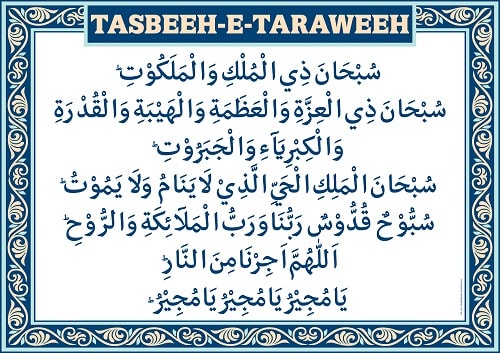Taraweeh Dua in Urdu Free Download here we are uploading the compulsory Namaz Taravih Dua for all the people who can online read and every time to download Taraweeh ki dua download. Read tasbih travi in Arabic and also with Urdu translation by biseworld.com. Free Download Ramzan Taraweeh Dua – tasbih travi in Arabic, Urdu & Hindi.
- May 9, 2021 - Explore Alpha Foxtrot's board 'Ubqari wazaif', followed by 559 people on Pinterest. See more ideas about islamic messages, islamic quotes quran, islamic phrases.
- Jun 30, 2014 - Namaz e Taraweeh ki Dua Holy month is going to very well in this month mostly Muslim needs Dae e Taraweeh Download here. Dua-a-Taraweeh is most need dua in Ramadan. In internet mostly people search as Dua-e-Taraweeh and Dua-a-Terawih we offer to download and share free. Also we have the Ramzan sehri or aftari ki.
سُبْحَانَ ذِیالْمُلْکِ وَالْمَلَکُوْتِ سُبْحَانَ ذِی الْعِزَّةِ وَالْعَظَمَةِوَالْهَيْبَةِ وَالْقُدْرَةِ وَالْکِبْرِيَآئِ وَالْجَبَرُوْتِ سُبْحَانَالْمَلِکِ الْحَيِ الَّذِی لَا يَنَامُ وَلَا يَمُوْتُ سُبُّوحٌ قُدُّوْسٌرَبُّنَا وَرَبُّ الْمَلَائِکَةِ وَالرُّوْحِ ط اَللّٰهُمَّ اَجِرْنَا مِنَالنَّارِ يَا مُجِيْرُ يَا مُجِيْرُ يَا مُجِيْر

History of Taraweeh:

Ramadan Taraweeh Dua
In the last year of the Prophet’s (PBUH) life, he came out one night and prayed Taraweeh. On that night, some people prayed with Him. during the second night, word spread, and more people joined in Taraweeh. Even more, people attended on the third. On the fourth night, the masjid was full, and the people awaited the Prophet’s (PBUH) arrival.
The Prophet (PBUH), however, prayed at home by himself after Fajr, He said:
“Nothing prevented me from coming out to you except the fact that I feared that it would be made obligatory for you.” (Muslim)
From the time of Hazrat Abu Bakr (R.A) to the beginning of Hazrat Umar’s (R.A) time, people prayed either individually or in small groups. Later, Hazrat Umar (R.A) gathered everyone behind one imam and they prayed 8 rakaats. Eventually, it was increased to 20 rakaat to make it easy for the people.
What is the meaning of Taraweeh?
Traweeh prayer is one of the remarkable specialties of Ramadan nights; for the whole month, Muslims line up at night to observe several optional rakaats and listen to and reflect on the recitation of the Qur’an. It is a very blessed and highly spiritual experience.
Taraweeh refers to additional prayers performed by Muslims at night after the Isha prayer during the Holy month of Ramadan.
Traweeh prayers begin from the first Moon-sighted evening (start) to second Moon-sighted evening (last day of Ramadan). This prayer is performed only during Ramadan of the Islamic calendar, after Salah of Isha (and before Witar, which is also prayed following imam who is pronouncing these three rakaats prayer words aloud unlike how it is done in other eleven months).
Taraweh prayers are prayed in pairs of two. A break is taken after every 4 (2+2) rakaats.
The Holy Prophet (PBUH) said:
“Allah has made fasting in Ramadan obligatory, and I have made the special prayer of Ramadan (i.e. the Taraweeh) a Sunnah“.
It is a Sunnah mu’akkadah to perform Traweeh in Jamia (Masjid). It means that it is a Sunnah mu’akkadah for the people of every mosque to arrange for the jamaat of the Taraweeh.
If a person after being sure that the jamaat of the Traweeh is being held in his mosque, performs the Taraweeh in his home without jama’at, the sunnah of the Taraweeh is discharged, but he will be deprived of the great sawab (reward) of praying with jama’at.
So, one should perform the Traweeh in the mosque as far as possible.
It is also a Sunnah to complete the recitation of the whole Quran in Taraweeh in Ramadan. It is thus advisable to request a Hafiz e Quran (one who has memorized the Holy Quran by heart) to lead the prayer of Taraweeh.
However, paying any fee to the Hafiz e Quran is not allowed. If no such Hafiz is available, the Taraweeh should be led by any Imam who has memorized the different Surahs of the Holy Quran.
As a general practice, the Holy Qur’an is completed in most of the mosques a few days before the end of Ramadan, i.e. on the 27th night or even earlier. In such a case, Taraweeh should be continued till the last night of Ramadan with the recitation of different surahs.
Those who leave Taraweeh after the completion of the Holy Qur’an are not correct, because Sunnah of the Taraweeh remains unchanged up to the last night.
The time of Taraweeh begins after the performance of the obligatory (Fard) prayer of “Isha”. Therefore, the one who has not performed the Fard prayer of Isha cannot join the prayer of Taraweeh. He should perform the Fard of Isha first, then join the Taraweeh. If he missed some rakaats of Taraweeh, he could complete it after the witar prayer.
For example, a person came to the mosque when the Imam has performed four rakaat of Taraweeh, he should perform the Fard of Isha first, then join the jama’at for Taraweeh. If he has missed 4 or 6 rakaats of Taraweeh, he should also perform the witar prayer with the Imam, then pray the four or six rakaats he has missed on his own, individually.
Taraweeh Prayer Time:

The time of Taraweeh begins after the performance of the obligatory (Fard) prayer of “Isha”. Therefore, the one who has not performed the Fard prayer of Isha cannot join the prayer of Taraweeh. He should perform the Fard of Isha first, then join the Taraweeh. If he missed some rakaats of Taraweeh, he could complete it after the witar prayer.

For example, a person came to the mosque when the Imam has performed four rakaat of Taraweeh, he should perform the Fard of Isha first, then join the jama’at for Taraweeh. If he has missed 4 or 6 rakaats of Taraweeh, he should also perform the witar prayer with the Imam, then pray the four or six rakaats he has missed on his own, individually.
How to Pray Taraweeh:
Taraweeh refers to additional prayers performed by Muslims at night after the Isha prayer during the Holy month of Ramadan.
Taraweeh prayers begin from the first Moon-sighted evening (start) to second Moon-sighted evening (last day of Ramadan).
This prayer is performed only during Ramadan of the Islamic calendar, after Salah of Isha (and before Witar, which is also prayed following imam who is pronouncing these three rakaats prayer words aloud unlike how it is done in other eleven months).
Taraweeh prayers are prayed in pairs of two. A break is taken after every 4 (2+2) rakaats.
Is Taraweeh compulsory?
Some Sunni Muslims regard the Traweeh prayers as-Sunnah Mu’akkadah. Other Sunni Muslims believe that Taraweeh is an optional prayer that may be performed at home.
According to this tradition, the Holy Prophet (PBUH) initially and briefly prayed the Traweeh in congregation during Ramadan but discontinued this practice out of concern it would be mandated, yet he never forbade it.
Traweeh Hadith:
Following are the Hadiths of the Holy Prophet (PBUH) that encourage us to perform Traweeh:
Narrated Abu Huraira:
Allah’s Messenger (ﷺ) said, “Whoever prayed at night the whole month of Ramadan out of sincere Faith and hoping for a reward from Allah, then all his previous sins will be forgiven.”
Ibn Shihab (a sub-narrator) said:
“Allah’s Messenger (ﷺ) died and the people continued observing that (i.e. Nawafil offered individually, not in congregation), and it remained as it was during the Caliphate of Hazrat Abu Bakr (R.A) and in the early days of Hazrat Umar’s (R.A) Caliphate.” (Sahih al-Bukhari)
Narrated Hazrat Ayesha (R.A) (the wife of the Prophet):
“Allah’s Messenger (ﷺ) used to pray (at night) in Ramadan.”
Narrated Abu Salama bin Abdur Rahman that:
He asked Hazrat Ayesha (R.A) “How was the prayer of Allah’s Messenger (ﷺ) in Ramadan?” She replied, “He did not pray more than eleven rakaat in Ramadan or in any other month. He used to pray four rakaat —- let alone their beauty and length—-and then he would pray four —-let alone their beauty and length —- and then he would pray three rakaat (witar).” She added, “I asked, ‘O Allah’s Messenger (ﷺ)! Do you sleep before praying the witar?’ He replied, ‘O `Ayesha! My eyes sleep but my heart does not sleep.”
Taraweeh Niyah:
Just stand behind the Imam in Taraweeh salah with the intention of what you are doing and who you are doing it for and that’s it. Allah (SWT) knows all and sees you thus there is no need to announce it, like when you are doing other acts of Ibadah like reading the Qur’an or braking the fast, etc. Allah (SWT) knows the reason have ikhlas.
Benefits of Taraweeh Prayer
- This special prayer improves physical and emotional health. The gentle up and down movements, including Sajdah and Ruku, performed while praying improves physical and emotional health as well as enhances the endurance of the person praying. It has been reported that people who fast the whole day and then perform Taraweh prayers at night feel more prosperous.
- This special prayer not only brings us closer to Allah Almighty but also provides us a chance to do some physical activity which keeps us from eating much and stay healthy and fit.
- It also improves the memory with the continuous recitation of the verses from the Holy Quran, screening the mind from inbound thoughts.
- Traweeh restores Muscle strength in aged persons. As people get older, their physical exercise decreases, which results in thinning of their bones. The repeated movements during Taraweh prayers improve joint flexibility, muscle strength, and tendon power. So, Taraweeh prayers improve stamina, self-confidence, and self-respect of the elderly people in being self-sustaining.
- Another advantage of Traweeh is to encourage visiting the mosque most for offering this special prayer more often in the congregation.
- A balanced meal at Sahoor and Iftar followed by Taraweh prayers can help a person reduce weight.
- As regular movements during the Taraweh are a form of exercise, they help burn down calories.
- Taraweh prayer gets all Muslims together from different walks of life in one place.
- Taraweh prayer also brings unity among Muslims all over the world.
- Taraweh prayer makes us worship more which in turn provides a peaceful sleep.
- Practicing the act of offering this special prayer for the entire month of Ramadan strengthens the Muslims faith and encourages Muslims to do what pleases Allah Almighty and what makes Him happy.
Dua For Taraweeh Prayer
Taraweeh Dua:
Dua Taraweeh Ka Subot
Taraweeh Dua is prayed after every 4 rakaats of Taraweeh.